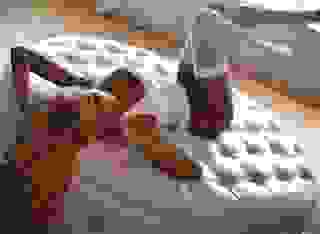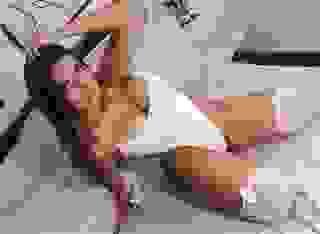Note: You can change font size, font face, and turn on dark mode by clicking the "A" icon tab in the Story Info Box.
You can temporarily switch back to a Classic Literotica® experience during our ongoing public Beta testing. Please consider leaving feedback on issues you experience or suggest improvements.
Click hereThey were packed in close, and there was barely enough room for all of the cadets in the bed of the truck to stretch out to sleep during the day. By the first night on the road, they had all receded into a semicomatose state from the effects of the brutal bouncing of the trucks on the primitive road south and the limited rations of water and food they were given.
Pyotr was wedged into one of the corners of the truck bed, behind the cab, and Vasily had muscled his way to his side. Orlov had repeatedly looked back through the glass in the back wall of the truck cab to check on Pyotr until Vasily had leaned his back against the glass and night had fallen, making it impossible for Orlov to pick any single cadet out of the teaming mass in the still-moving truck. The convoy had stopped every couple of hours, but only long enough for the men to take pisses and dumps at the side of the road and to, most unsuccessfully, work the cramps out of their arms and legs.
All of the men complained about the bruises that were being inflicted on their torsos, but Vasily had yelled out that the Bolsheviks would give them worse than bruises if they ever caught up with them. And then the men's complaints were reduced to mumblings under their breath. None of the cadets stood up to Vasily.
While they were still within sight of the academy buildings they were abandoning, Vasily was already touching Pyotr with his hands and trying to get as close to him as possible. Pyotr fended him off as well as he could, but by the second night on the road, he was so exhausted and only half conscious, and he just lay there, listlessly, as Vasily worked his hand into Pyotr's unbuttoned fly and slowly jacked the younger cadet off. And then Pyotr managed no more than soft whimpers and panting in shallow breaths as Vasily turned him on his belly, pulled his trousers down around his knees, covered him with his body at full stretch, and slow fucked him.
Most of the cadets around them were too tired to notice. Those who did notice merely thought that Vasily was doing what he had done every night in the barracks to anyone he pleased to master—by the right of the strongest. Three or four moved close to watch, savoring what Vasily was doing to the young nobleman. Many of the others wanted to do the same to him—and now that he'd been taken by one of them, might also get their chance. While Vasily fucked Pyotr, others passed the compliant Mikhail around—to one, by one, satisfy their own lust.
Vasily was grinning when Pyotr opened his eyes in the sunlight of the third day, thinking that he was the first who had fully had the finely formed third son of a prince, and a groaning Pyotr said nothing to disabuse him of that thought. Vasily had taken him more than once in the night and had whispered in his ear that he would keep on doing so as long as they were on the road.
Thus, Pyotr had the first happy thought for weeks when he saw that they were entering an urban area and one of the cadets, who have come from the south, said he thought they were entering Novorossiysk.
The happy thought evaporated, however, as they approached the wharf on the Black Sea.
Chapter Two: The Docks of Novorossiysk
A cheer had gone up along the line of trucks as the convoy conveying the cadets of the Imperial Military Academy weaved down the tail end of the Caucasus Mountains spilling into the sea at the eastern edge of the Novorossiysk harbor. From the mountains, Novorossiysk looked welcoming, with its sparkling beaches and the sun glinting off the onion-shaped dome of the Russian Orthodox church dominating the town's main square.
Even the view of the teaming mass of people on the town's wharf was heartening until the trucks grew closer and it could be seen that this wasn't the expected massing of the soldiers of General Kothak's army that the cadets were to join up with, but a huge surge of refugees trying to get onto the ships in the harbor to take them on to the Crimea Peninsula, two hundred miles off in the distance to the east across the glassy-surfaced sea. The Crimea was one of the few bits of Russia that was still held by the White Army and represented freedom and security to the adherents of the tsar.
Kothak's couriers had told the academy head that the cadets were to meet up with his army at the wharfs, but it was obvious before the convoy had even entered the town that a connection was improbable amid the chaos they could see down there in the harbor. The convoy stopped in the town square, and the cadets and faculty jumped out of the trucks to stretch their legs as a party of faculty members that included Grigory Orlov went on to the harbor to try to meet up with Kothak's staff. They returned shortly with long faces, and Pyotr overheard them reporting to the academy head.
"Kothak has already shipped his forces on to the Crimea," Orlov reported. "He says that the Bolshevik forces coalescing here are too strong for the White Army to hold Novorossiysk. He advised that the cadets should board the ships down there and join the White Army forces in Sevastopol."
"Down there? Through that teeming crowd?" The cadet, Mikhail Shevemetev, standing beside Pyotr and Vasily within hearing distance of the faculty members had been the one who had blurted that out.
"We can cut our way through that mob," Vasily boasted, looking almost ecstatic at the prospect.
Orlov drifted over to them, and speaking directly to Pyotr in a low tone, said, "Keep close to me. There are two ships down there that we've arranged to board. I want you on the same ship I take, near me."
Vasily gave him a dirty look and made sure that Pyotr was at his side as they boarded the trucks again to descend to the harbor.
The crowd was too thick, panicked, and crazed eyed for the trucks to have any hope of managing to part a path to get to the docks without stalling out on a pile of bodies, so they stopped at the edge of the wharf square and the cadets climbed down, formed a close wedge, and plowed their way into the melee.
It wasn't just people that impeded their progress. The refugees had brought far more of their precious possessions than they would ever be permitted to carry with them onto the ships. It was clear to all that the cargo on the ships would be elbow to elbow people, not possessions, even though over the heads of the crowd, Pyotr could see an ornate grand piano that was being manhandled up a gangplank—only to teeter briefly and then to fall into the choppy waters between the side of the ship and the quay.
As the cadets' wedge parted the ways in its journey toward the two ships now at the quay—and a third standing just off the docks and using a flatboat to ferry passengers out to the ship, refugees began to attach themselves to the sides and the back of the wedge, using the cadets to draw nearer to their goal of freedom.
Women were fighting valiantly to keep their babies and young children above the thrashing legs and feet of others—not always successfully—and there was a wailing of grief and loss floating above the heads of the crowds. Pyotr watched in horror as one woman, having dropped her baby, went under the feet of the throng herself in search for it, both—possibly mercifully—to be trampled to death. He had no time to think on this, though, as another woman was pulling at a sleeve, crying out for his protection in exchange for a jeweled tiara she was holding out in her hand. A hand from the crowd, reached out and grabbed the tiara, though, and it and the woman disappeared from Pyotr's vision as Vasily and Orlov pushed him along.
Pyotr wondered why there were only three ships in the harbor. He could see the masts of several others standing off the harbor. When he pointed these out to Orlov as they shuffled along, Orlov spat in derision. "Those are the ships of the Allies—the British, French, Italians, and Americans. They are sitting out there just to observe and report. If they support the imperials at all, it is only with their lips."
"But there's one moving toward us, into the harbor now," Pyotr said. "A huge man-of-war."
"The biggest would be the HMS Cardiff, the British flagship," Orlov answered. "The next largest would be the Americans' USS Galveston. I was told of them when I was here earlier hoping to meet up with Kothak's couriers. I don't know which that one would be."
Pyotr's attention returned to the wharf. He saw, over the top of the crowd, an elaborately carved carriage making better headway than they were from another direction in the square. Here the masses of people were making a path, in awe, for the progress of the carriage in a manner that they had shown no willingness to do for the academy's trucks.
He realized he recognized the men in the box of the carriage—and that, therefore, he knew who was inside the carriage.
"It's Olga," he cried out in recognition.
"Who?" Vasily, who was in front of him in the wedge, with Orlov behind him and Mikhail off to the side somewhere.
"The Grand Duchess Olga. My father's cousin, sister to the tsar. The people love her; that's why they are making way for her carriage."
"And probably why that ship is coming into harbor," Orlov muttered. "It must be HMS Cardiff. King George no doubt has no intention of leaving one of his mother's great-granddaughters stranded here."
Pyotr began bouncing up and down, attempting to get his head above the crowd and waving his cadet's cap in one hand. "Cousin Olga," he was singing out. "It's me, Pyotr. Over here."
It must have dawned on Pyotr and, alarmingly, on Orlov in the same instant that the deliverance of Olga could be a better answer for Pyotr's future than casting his lot with the cadets and Orlov, because as Pyotr more frantically sought to get the attention of Olga's footmen, Orlov was fighting to pull Pyotr's arms down and propelling him forward with the wedge. Orlov's efforts, however, were also propelling the two off to the side, causing them to break away from the wedge.
As the two stumbled into the crowd around them, Pyotr saw the slight figure of a young woman, dressed somewhat more elegantly than those around her, slipping toward the ground. He pushed toward her and reached down, catching her just in time with an arm around her slender waist and pulling her back upright. He knew well that if she'd gone under the feet of the mob, she'd have been trampled into an unrecognizable pulp of blood, bones, and ripped satin within moments. She gave him a radiant smile and murmured her thanks in the impeccable language of the Russian imperial court as he pulled her up from danger.
Pyotr realized two things instantly—that she was the most beautiful woman he'd ever seen and that he was in love.
It was only an instant of contact, though. The arms of a tall, muscular man in the uniform of a Russian naval officer were lifting the young woman away from Pyotr, and with no more than a menacing look of challenged possession on his face, the officer was guiding the young woman in a close embrace away from Pyotr. In a single breath's time, the two were lost in the crowd.
Pyotr, and Orlov who had held onto Pyotr as possessively as the naval officer had regained control of the mysterious young beauty, found themselves lost in the crowd too. In the short time it had taken for Pyotr to save the young woman, the cadet's phalanx had moved on, leaving them stranded.
Orlov didn't falter, though. He cried out, "This way," and started shoving Pyotr toward one of the docked ships.
If anything, the crowd was more angry and aggressive the closer Pyotr and Orlov got to the two docked ships. But Orlov was strong and as cruel and brutal as anyone in the milling mass of refugees. He was brandishing a strong steel cane and was using it without mercy to clear a path. It wasn't long before they were close to the ship Orlov had been striving toward and nearly at the edge of the wharf. Pyotr could see that, off to their left, the ferry now was loading up academy cadets who had managed to wedge their way to that position.
"The cadets are there," Pyotr cried out. "Shouldn't we be—?"
"We arranged for places on two of the ships," Orlov answered, raising his voice over the din of the crowd. "There, just ahead, is the embarkation point. We will take this ship."
Pyotr turned his head to take one more look at the ferry, covered now in the gray, with red trimmings, of the uniforms of his fellow cadets. He only had time to pick out the figures of Vasily and Mikhail on board the ferry before he heard the screams and saw the overloaded flat-bottomed boat flip and a cascade of gray and red slip off into the churning water of the turgid harbor.
"Mikhail and Vasily," he cried. "The cadets are in the water. Neither can swim."
But Orlov's ears were unhearing. He had already muscled Pyotr up to the embarkation booth. He was gruffly calling out to the ship's officer there—and receiving the attention that his obvious authority merited. "I have Count Pyotr Romanov, nephew to the tsar, here," his voice rang out. "He's of the Imperial Military Academy cadet contingent booked for passage on this ship. Make way for the count."
* * * *
Pyotr almost blushed with embarrassment at the deference that the ship's officers and sailors showed him when Orlov identified him as a Romanov. It had been the same out on the wharf when, despite the melee in progress, the way had been made for the grand duchess's carriage. The carriage was piled high with suitcases and trunks, which, no doubt, would all make their way on the British man-of-war, even while the masses on the docks would be lucky to get their children on a ship, not to mention any belongings.
Secretly, he had increasingly understood the crux of the revolution against his family in the two years he'd been in exile with the Imperial Military Academy cadets. His father hadn't been like this—or so Pyotr thought. His father had always treated his servants and those in the fields on their vast estates like his family. He had been as much a father figure to his serfs as Tsar Nicholas had been to all Russians. That's what Pyotr had always believed. But there had never been any question that his father was the patriarch and that all of the servants and workers in the field were there to serve him and his family. Pyotr had come to realize that he had expected every privilege that had come his way. And that it had stunted both his intellectual and emotional growth.
He had become wiser and more aware and human in these last two years in exile and being treated like any other cadet—well, almost. He didn't want to lie to himself about his special treatment, even in Kazan—and he had decided well before he arrived at the quay that, should he survive the revolution, he would change his name. He would take his mother's patronymic of Apraksin and cease to be any part of a Romanov.
Orlov was not going to let that happen on the ship, though. The teacher dominated Pyotr to the extent that it seemed he had no special reverence for the Romanovs. But Pyotr was Orlov's own ticket to safety and comfort. And thus, Pyotr realized that Orlov was going to stay attached to him as long as possible and to see that everyone who would be impressed knew that Pyotr was a Romanov.
The two were ushered immediately on board, and shortly afterward the gangplank was being raised—which was no easy task. Sensing that yet one more opportunity for fleeing Novorossiysk was evaporating, the multitudes on the docks became even more agitated and an ominous keening sound built to a crescendo. The ship's sailors had to lower their bayoneted rifles and form a line to back up toward the gangplank. The rougher men in the crowd were moving to the front and closing in on the line of sailors. Mere boys had swum out and around to the end of the dock and were climbing onto it from behind the line of sailors, and the officers standing behind the lines stumbled to the side of the dock and struck the boys back into the water with the stocks of their rifles as their heads came up over the side.
The rabble was quite evidently preparing to rush the line of sailors when the first shot was fired, which was followed immediately by a volley of rifle fire that tore into the approaching refugees and sent several of them, bleeding, to the stone surface of the wharf. This gave the line of sailors only a few seconds of respite, but it was enough for most of them to turn and follow their officers up the gangplank and pull the plank up from the dock. Not all of them made it, though. Those sailors who were an instant too slow to move were overtaken by the angry mob and torn to pieces. Captured rifles were gathered up and raised toward the ship, but the sailors at the rails of the ship were quick to take aim and cut anyone down on the dock who pointed a rifle in the direction of the ship.
As the ship pulled off from the dock, a few of the younger male refugees leaped out and caught the mooring lines that hung from the sides. Any who tried to climb to the ship's rails were struck away and into the water by the butts of the sailor's rifles. All who just hung there, in hope, eventually lost their grip and fell away into the waters of the harbor before the ship had gained the open sea.
The rest of the rabble on the docks, though, turned their fury on the one remaining ship lashed to the quay. The crew of this vessel wasn't nearly as prepared for the sudden onslaught of panicked humanity, and the ship was quickly covered by maddened refugees who swarmed over it like a million ants. Pyotr was never to learn if the ship ever was able to put to sea with a load of passengers, or whether hope was lost for all by the total loss of any organization and control. Gunfire could be heard around the periphery of the wharfs; Pyotr could only hope that order was being restored.
Pyotr stood at the rails, in both disgust and shock, watching, as one by one, the young men hanging onto the mooring ropes hanging off the sides of the ship lost their grip and slid down the slimy side of the vessel and into the sea. He watched each one, in desperation, willing the young man to show that he could turn his face back to the wharf and swim the distance with strong, assured strokes. But each one whose progress he followed quickly foundered and sank from sight.
"It's a horrible sight, isn't it?" The voice was low, soft, and melodic—a stark contrast to the scene playing out before his eyes. Pyotr turned to see that the young woman he'd saved from being trampled on the wharf was standing beside him.
"I never thought to see anything like it, no," Pyotr answered. He looked around to see if either Grigory Orlov or the ship's officer who had been guiding the young woman were nearby, but he could see neither. He imagined the officer was busy helping to move the ship out to the sea. Orlov, he knew, was off trying to wrangle some sort of accommodation for them. Most of the refugees on board had to find just enough space to stretch out on the open deck or they had to disappear down into the smelly, dank hold. Pyotr assumed the deck would be where the fittest and most clever would stake their territory. He himself was prepared to bed down anywhere, just being grateful he was aboard this ship. He had yet to be able to mourn the loss of Mikhail and Vasily properly—intervening events hadn't allowed for that. But he knew that in the dark of the night visions of them floundering in the water of the harbor just as the young men who had slipped from the ropes had done would invade his mind and challenge his emotions.
"I wish to thank you for preventing me from being trampled back there," the young woman said. "I forever will be grateful."
"I am glad I was where I could be of assistance to you," Pyotr answered.
"I am Katya, from Kiev," she said. "My father is Fydor Betskoy."








